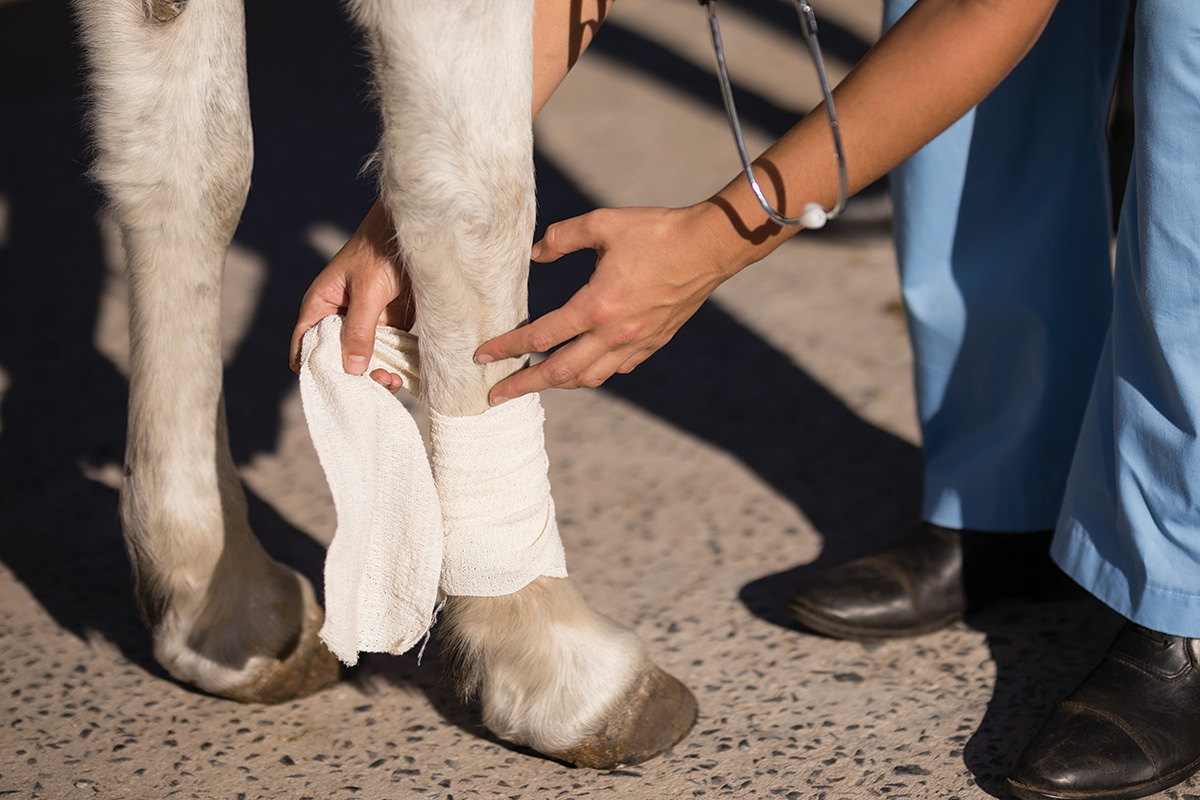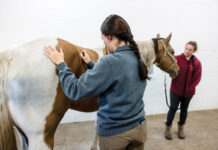
I’d been treating my patient, a sweet Quarter Horse mare named Maizey, for almost two weeks. Maizey had been running loose in a side pasture and got tangled in some fencing wire. I’d spent a very long night stitching the horse’s chest and torso back together. I wasn’t terribly worried about those wounds; it was the horse’s leg wound that was the problem.
Purple Power
Fortunately, Celia realized quickly that her beloved mare was missing, and she and her husband went searching for her. Carl had cut Maizey free from the wire and pulled out his pet remedy: the purple spray found in almost every barn, despite me scolding him every time he used it.
By the time I arrived, Maizey was purple as well as red from the blood, and after I’d finished cleaning her up, I was purple and red from head to toe as well.
Carl roared with laughter when he saw me and informed me that I was going to be purple for some time, “cause that ain’t gonna wash off easily, Doc. It’s good strong stuff, and that’s why I like it.”
I’d gritted my teeth and pulled out a bottle of rubbing alcohol to clean my hands and arms. My clothing was beyond help, and I knew from experience that the stains weren’t coming out. Carl received another scolding from both Celia and I, but he paid no attention.
Carl suffered from chronic kidney and bladder stones, and lately he was visiting his doctor more and more frequently. After ribbing me for a while, he’d hopped in his truck to head to an appointment.
When Celia led Maizey down the aisle toward me for our weekly recheck, I could tell by her face that Carl had been at it again. There was a Vetrap and duct tape bandage on the horse’s lower leg that had slid down and was flopping around the ankle, exposing the wound. Even worse, it was purple again.
Celia brought her horse to a halt in front of me and gave me her special exasperated-with-Carl death look. I knew Carl was in for it when he returned from yet another doctor’s appointment.
“Let’s see what we’ve got, Celia,” I said as I began to cut the bandage off. “Maybe Carl went easy this time.”
Chemical Overload on the Wound
Unfortunately, Carl had not gone easy this time. In fact, he’d outdone himself, and I groaned when I saw a thick coating of the stuff on the leg.
Maizey had a stained muzzle from licking at the wound, and the horse left a large colorful smear across Celia’s barn jacket. Celia dragged the hose over grimly and began to wash the wound, as purple water ran across the barn floor and down the drain.
It took almost 30 minutes to get Maizey cleaned up, and because the spray was almost 90 percent alcohol, I had to place a special dressing on the leg. Wounds don’t like caustic chemicals and get irritated very easily. If all infection is gone, they prefer a clean, moist and quiet healing environment so that the healing cells can migrate to where they’re needed and not be disturbed, irritated by chemicals or scrubbed off by overzealous wound cleanings. My old mentor, Dr. George Platt, used to tell me sternly that if I wouldn’t put a particular substance in my eye, don’t put it on a horse’s wound, and I followed those instructions religiously.
As I finished bandaging Maizey, Celia muttered that she was going to put a padlock on the stall door to keep Carl out. As I walked out of the barn, I heard the familiar roar of Carl’s old truck, and soon he was parking in front of the barn. Celia remained behind, presumably to throw away every bottle of purple stuff that she could find. But when she heard the truck pull up, she hastened out of the barn, clutching a remaining can of the spray.
Giving Up for Good
Carl exited his truck and slowly walked toward us. Patch, his beloved Border Collie, shot out from underneath a nearby bush and followed him over.
“Carl, are you OK?” I asked. I’d never once seen Carl move slowly.
He grimaced. “They flushed out the plumbing today.” He pointed miserably at his groin. “It hurts like hell, Doc.”
Celia was moving towards us shaking the spray menacingly, and on a whim, I grabbed the bottle from her and started reading the label out loud.
“Ninety percent alcohol, wow, that’ll burn out just about any infection! And gentian violet soaks deeply into inflamed tissues. You might pee purple for a while, but Carl, you should use this stuff to treat your bladder infection!”
Carl looked me in horror, and I gave him an innocent smile and offered him the bottle. He muttered something, then headed to the house in a stiff, crouching gait, Patch at his side.
Celia was howling with laughter.
“Oh dear! Dr. Diehl, I don’t know what gets into you sometimes! I bet Carl never goes near this stuff again!”
Eventually I started packing up my truck. Celia gave me a quick hug, then smiled sadly.
“I better go tend to my husband, Doc. He’s not getting any younger and this bladder problem really worries me.”
I was starting to feel a little guilty, but Celia winked at me.
“I think I’ll hang a bottle of that purple stuff on the refrigerator door. Then he won’t eat all the ice cream.”
Also Read: More Editions of Vet Adventures
This column about treating a horse’s wound appeared in the August 2022 issue of Horse Illustrated magazine. Click here to subscribe!






